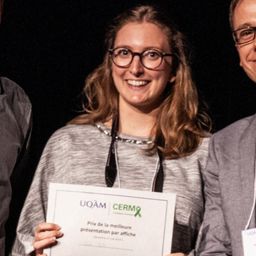Loss of ligand-dependent oligomerization may be a pathogenic mechanism underlying CASK mutations
Mon statut pour la session
Loss of ligand-dependent oligomerization may be a pathogenic mechanism underlying CASK mutations
Yingzhou Edward Pan1, Debora Tibbe2, Frederike Harms2, Kerstin Kutsche2, and Hans-Jürgen Kreienkamp2
1Institut nationale de la recherche scientifique
2University Medical Center Hamburg-Eppendorf (UKE), Department of
Human Genetics
The calcium/calmodulin-dependent protein serine kinase CASK is a member of the MAGUK family of proteins. CASK fulfills various functions in neurons by binding to various interaction partners. When bound to Liprin-α and Neurexin, CASK acts as a presynaptic scaffolding protein. When bound to Sap97, CASK regulates postsynaptic glutamatergic receptor trafficking. When bound to Tbr1 and CINAP, CASK regulates T-element promoters.
The CASK gene is in the X-chromosome. Female patients with heterozygous loss-of-function mutations and male patients with hemizygous missense mutations exhibit microcephaly with pontine and cerebellar hypoplasia with intellectual deficiencies. But the pathogenic mechanism underlying these phenotypes is not clear. Analyzing the missense mutations identified in the male patients provides an opportunity to study which of CASK’s functions may underlie the observed phenotypes.
We analyzed how 10 missense mutations affected the ability of CASK to bind to its partners. We then determined whether loss of partner binding affected the function associated with that partner. Liprin-α was not affected by any mutations while Sap97, Tbr1, and CINAP were all affected by 1 or 2 mutations. But the most affected partner was Neurexin, whose binding was decreased by 5 of the 10 mutations. 4 of these 5 mutations disrupted CASK’s ability to oligomerize when bound it binds to Neurexin. Several MAGUKs are known to oligomerize when bound to their PDZ-ligands in order to play scaffolding roles.
This suggests that the loss of CASK’s presynaptic scaffolding function may be a key pathogenic mechanism underlying CASK mutations.



